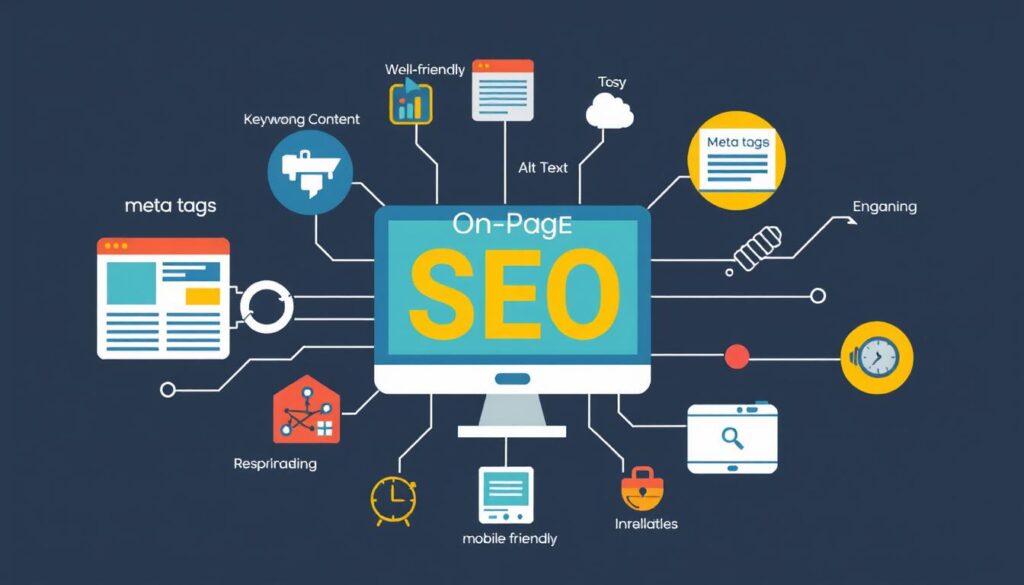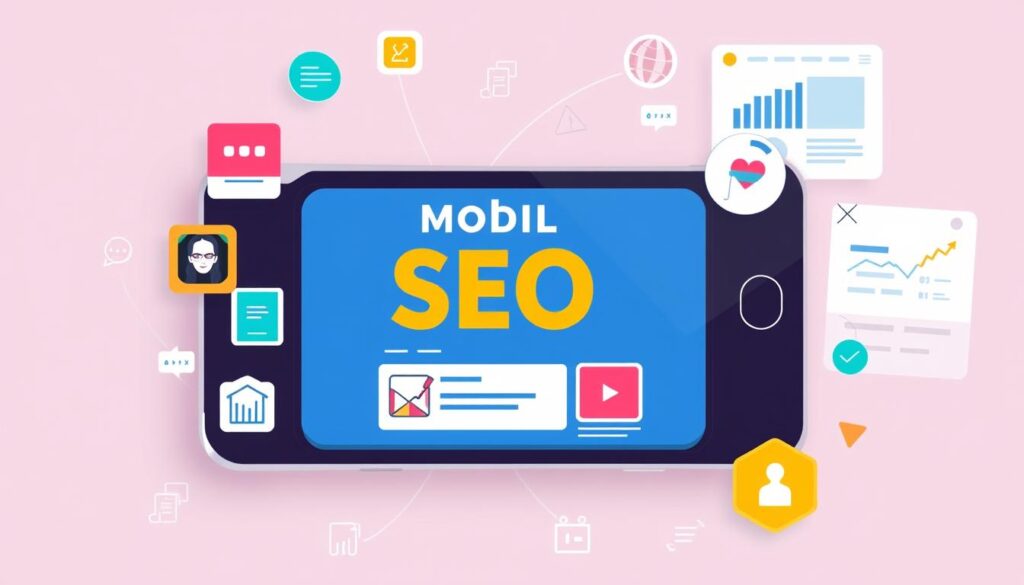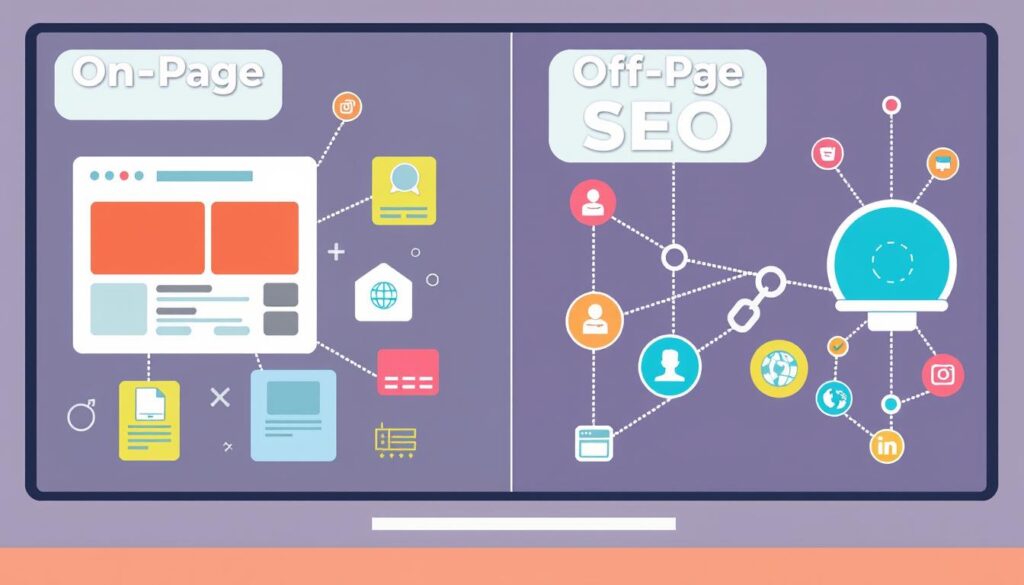Most online experiences start with a search engine. Yet, how websites reach the top of search results is not well-known. Google uses over 200 factors to rank websites. The key is the mix of on-page and off-page SEO.
For a website to succeed, a perfect blend of search engine optimization strategies is needed. On-page SEO makes your site search engine friendly. Off-page SEO boosts your site’s reputation with backlinks and social media.
Improving your site for users and search engines is crucial. Your site’s authority also depends on other websites’ endorsements. This shows that while you control on-page SEO, off-page SEO relies on others.
If you’re interested in the balance between on-page and off-page SEO, it’s a challenge worth taking. Both are key to optimizing your website and reaching the top of search engine rankings.
Key Takeaways
- On-page optimization, from titles to image alt texts, is very important.
- Link-building is the heart of off-page SEO, showing your site’s credibility.
- On-page strategies can be directly influenced, but off-page SEO needs external endorsements.
- Well-balanced SEO strategies boost your site’s visibility and attract better traffic.
- High-quality content is crucial for search rankings, matching relevance with user intent.
- Google’s algorithm considers both on-page and off-page factors, so neglecting either harms your online presence.
- A strong social media presence can greatly help off-page SEO, bringing more organic traffic.
Introduction to On-Page vs Off-Page SEO
Knowing the difference between on-page and off-page SEO is key for better website visibility. On-page SEO deals with content optimization and website structure. It makes sure your site meets quality and SEO standards. This approach improves your site’s ranking and draws more visitors.
Off-page SEO focuses on external factors that affect your site’s reputation. It involves getting backlinks from trusted sites. This boosts your site’s visibility and reputation, helping you rank higher in search results.
Combining on-page and off-page SEO creates a strong optimization plan. On-page SEO lets you manage meta tags, headings, and content quality directly. Off-page SEO, however, increases your site’s authority by forming alliances and getting recognized by other sites.
| SEO Aspect | Control | Impact Time |
|---|---|---|
| On-Page SEO | High (Direct control over content and HTML) | Immediate to Short-Term |
| Off-Page SEO | Lower (Depends on external factors) | Long-Term |
Using both on-page and off-page strategies makes your site trustworthy and valuable. This is a crucial step for any effective SEO plan.
The Cornerstones of On-Page SEO: Content and HTML
At the heart of successful digital marketing strategies lies effective On-Page SEO. It combines robust content and meticulous HTML optimization. This boosts both search engine visibility and user engagement. Our focus is on following SEO best practices and improving user experience. This dual focus greatly increases a site’s credibility and rankings.
Optimizing Content for Search Engines and Users
Our first cornerstone is content creation. It starts with delivering high-quality information that meets user needs and interests. We use keyword optimization to make sure content resonates with the audience and matches search queries. Keywords are used naturally in the text, headers, and meta tags.
Content quality is key to engaging and keeping visitors. This increases the time they spend on the site and lowers bounce rates.
HTML Optimization: Tags, Attributes, and Meta Data
At the same time, optimizing HTML elements is crucial. This includes title tags, meta descriptions, and header tags. These elements are crafted to include relevant keywords, improving visibility and click-through rates from search engine results pages (SERPs).
A well-optimized title tag captures the page’s essence and entices clicks. A concise meta description offers a preview that encourages exploration. Internal linking is also important. It makes navigation easier and improves site architecture, enhancing both user experience and search engine crawlability.
- Keyword Placement: Integrate target keywords naturally into titles, headings, and body content to enhance discoverability.
- Meta Tags: Utilize meta descriptions and title tags to provide clear previews in SERPs, optimizing for targeted keywords.
- Internal Links: Connect related content across your site to help users navigate easily and discover more relevant information, boosting page views and user engagement.
To summarize, focusing on high-quality content and sophisticated HTML structuring is key. Websites attract and retain more dedicated traffic. These efforts in keyword optimization, internal linking, and prioritizing user experience are essential. They transform an ordinary site into a powerful, SEO-optimized web presence.
Essential Techniques for Off-Page SEO
Creating high-quality content is just the start. You also need to promote and link it from other sites. This boosts your online presence and search rankings.
To succeed online, using off-page SEO is key. This includes getting valuable backlinks and working with influencers. Every step in off-page SEO helps your site’s reputation with users and search engines.
The Power of Link Building
Backlinks are crucial for ranking high in search results. Analyzing your competitors’ links can help improve your strategy. Quality backlinks are more important than quantity, boosting your site’s authority.
Brand Mentions and Social Signals
Most online experiences start with a search. A strong digital presence is vital. Social signals and brand mentions help manage your online reputation.
Influencer marketing is also powerful. It connects brands with potential customers, increasing visibility and credibility. This strategy boosts direct traffic and SEO efforts.
To succeed in online marketing, focus on off-page SEO. Manage your online reputation, work with influencers, and build quality backlinks. These actions are essential for your digital success.
On-Page vs Off-Page SEO: Key Elements
In today’s digital world, knowing the difference between on-page and off-page SEO is key. We’ll explore content quality, keyword optimization, backlinks, and social media marketing.
Content Quality and Keyword Optimization
On-page SEO focuses on content quality and keyword use. It’s about optimizing URLs, page titles, and meta descriptions. Google wants URLs to be clear for users, which helps SEO.
Good page titles and meta descriptions can also boost click-through rates. This tells search engines our content is relevant to certain searches.
Internal links help site structure and spread page authority. Google says this is important. Outbound links, though not directly ranking, make content more credible and user-friendly.
Backlinks and Social Media Marketing
Off-page SEO is about backlinks and social media. Backlinks are like endorsements from other sites, improving reputation and visibility. Google fights link spam, showing the value of quality backlinks.
Unlinked mentions can also show your site’s standing. Social media marketing boosts content marketing and social signals. It helps drive conversations and interactions, showing a site’s value and authenticity.

Here’s a comparison of essential on-page and off-page elements and their influence on a site’s SEO:
| SEO Element | On-Page Impact | Off-Page Impact |
|---|---|---|
| Backlinks | None | Critical for Authority and Trust |
| Social Media | Generates User Engagement | Enhances Brand Visibility and Interactions |
| Internal Links | Improves Site Architecture | None |
| Page Speed | Essential for User Experience | None |
| Mobile Friendliness | Crucial for Mobile SEO | None |
Mastering these SEO elements and using both on-page and off-page strategies can greatly improve your online presence. This leads to better search engine rankings and digital success.
Tools to Conduct On-Page SEO Audits
For businesses looking to boost their online presence, an on-page SEO audit is key. These audits uncover areas for improvement in search optimization and technical SEO. Advanced SEO tools help businesses tackle these issues, making their websites better.
Many tools are recommended for SEO audits, like Ahrefs, Moz Pro, and SEMrush. These tools give deep insights into on-page SEO, such as meta descriptions, title tags, and header tags.
- Meta Descriptions and Titles: These are checked to be engaging and include the right keywords without overdoing it.
- Header Tags: Proper headers make content easy to read and help search engines understand the site’s structure.
- Image Optimization: Ensuring alt text and image compression improves page speed and user experience.
- Internal Linking: This is vital for site architecture and link equity, ensuring links are relevant and well-placed.
Google Analytics and Google Search Console are also part of the SEO audit report. They offer performance metrics and user data, crucial for optimizing webpages for both users and search engines.
| SEO Audit Component | Tool Used | Importance |
|---|---|---|
| Link Building Analysis | Ahrefs, SEMrush | Essential for establishing domain authority |
| Meta Tags Optimization | Moz Pro, Google Search Console | Crucial for click-through rates and relevance |
| Page Speed Analytics | Google PageSpeed Insights | Improves user experience and SEO ranking |
| Mobile-Friendliness | Google Mobile-Friendly Test | Essential for ranking in mobile search |
In conclusion, using specific tools for an on-page SEO audit greatly helps clients find and fix weaknesses. This systematic approach ensures their online content is optimized for better search engine rankings. It makes their digital presence strong and efficient.
How Off-Page SEO Complements On-Page Efforts
On-page and off-page SEO work together to boost your brand identity and online presence. On-page SEO optimizes your content, while off-page SEO builds your site’s authority and trust. Using smart SEO tactics, like working with influencers and engaging in communities, can greatly improve your on-page efforts.
Establishing Online Authority and Trust
Building a strong online authority is more than just quality content. It’s also about how others see your content. Backlinks from trusted sites and brand mentions help increase your authority. We work on partnerships and content placements to show our expertise to search engines and users.
Engaging in Community and Influencer Outreach
Community and influencer outreach help create lasting connections for growth. These efforts expand our reach, build relationships, and increase content advocacy. This strengthens our brand’s online visibility and influence.
| SEO Factor | Impact on Brand Identity | Impact on SEO Ranking |
|---|---|---|
| Backlinks | Enhances credibility and authority | Directly influences search engine rankings |
| Brand Mentions | Builds trust and reinforces identity | Improves perceived site relevance and authority |
| Social Media Marketing | Expands brand reach and user engagement | Indirectly benefits SEO through increased content visibility |
| Customer Reviews | Boosts consumer confidence and loyalty | Contributes to local SEO and enhances trustworthiness |
By combining off-page factors with on-page strategies, we improve our website’s reputation. This leads to better site metrics and superior SEO results. A holistic approach is key to success in today’s digital world, creating a lasting online presence that showcases your brand identity.
Maximizing User Experience Through On-Page SEO
Improving user experience starts with a mobile-friendly design. This makes webpages work well on all devices. It’s key for keeping visitors happy and engaged.
Fast-loading pages are crucial. They keep users interested and boost search rankings. Pages that load quickly have fewer people leaving, which is good for SEO.
Technical SEO is also vital. It makes websites easier for search engines to find and index. This includes using keywords wisely and making URLs clear and short.
We focus on technical SEO to meet and exceed user needs. By improving mobile-friendly design, page load speed, and technical SEO, our site is easy to use and ranks well. We keep our site up-to-date with the latest tech and trends.
Learn more about on-page and off-page SEO at Sure Oak’s detailed review. It shows how these strategies can boost rankings and improve user experience, following Google’s E-A-T guidelines.
In summary, we improve page load speed, enhance mobile-friendly design, and update technical SEO. This creates a better site that attracts and keeps visitors, leading to more engagement and loyalty.
Building Your Domain's Reputation Off-Page
In the world of off-page SEO, making your domain more credible is complex. On-page elements are just the start. Off-page tactics like influencer marketing, social media presence, and handling online reviews are key. These strategies help turn a simple online presence into a strong reputation that earns trust.

Outreach and Content Marketing Strategies
Good outreach helps your brand reach more people, using digital PR and content marketing. Working with influencers and content creators boosts your brand’s visibility. It also helps get quality backlinks.
For example, guest posting on trusted sites and using unlinked brand mentions for link building can greatly improve your off-page SEO. These actions are in line with the basics of off-page SEO, helping to build domain authority through external efforts.
Managing Online Reviews and Customer Feedback
Handling digital customer interactions is also crucial. Online reviews can sway buying decisions and affect your site’s ranking. Responding to reviews, fixing feedback, and encouraging happy customers to share their experiences strengthens your domain’s reputation.
Tools like Semrush’s Social Content AI help with an active social media presence. They make it easier to quickly respond to customer feedback and build a brand community.
| Off-Page SEO Tactic | Key Benefits |
|---|---|
| Influencer Marketing | Increase in brand visibility and customer reach |
| Content Marketing and Guest Posts | Enhanced domain authority and backlink quality |
| Active Social Media Management | Improved engagement and direct feedback channel |
| Managing Online Reviews | Boost in reputation and customer trust |
Combining targeted strategies like influencer partnerships and careful review management is key. It builds a strong off-page SEO base that benefits any domain.
The Intersection of On-Page vs Off-Page SEO
Understanding the connection between on-page and off-page SEO is key for better website optimization and higher search engine rankings. Knowing how each works helps businesses use more effective SEO strategies. This leads to more organic traffic and better engagement.
On-page SEO focuses on your website’s content, meta tags, and internal links. It makes your site more relevant and authoritative. It also improves user experience and lowers bounce rates.
Off-page SEO, on the other hand, involves building backlinks, improving social media, and getting online reviews. These actions increase your site’s visibility and credibility online.
| SEO Type | Core Components | Key Benefits |
|---|---|---|
| On-Page SEO | Content optimization, title tags, internal linking | Improves relevance, user experience, engagement |
| Off-Page SEO | Backlinks, social media, online reviews | Boosts visibility, brand awareness, credibility |
| Technical SEO | Website speed, mobile responsiveness | Enhances site performance, user experience |
To really improve your search engine ranking, you need to use both on-page and off-page SEO. Combining these strategies creates a strong SEO strategy. For more on optimizing these areas, check out the differences between on-page and off-page.
In short, for better website optimization and search engine rankings, focus on both on-page and off-page SEO. Each part is crucial for a strong online presence. This is vital for businesses in today’s digital world.
Strategies to Improve On-Page SEO Performance
On-page SEO is key to making our website more visible and user-friendly. By focusing on content optimization, including meta tags and SEO techniques, we can rank higher and get more visitors. Here, we’ll look at some ways to boost your on-page SEO.
Creating unique, valuable content is essential. Each page should solve a problem or answer a question for our audience. Use target keywords wisely, optimize headline tags, URLs, and use internal links and images well. Also, make sure your site loads fast and works well on mobile devices. These factors greatly affect user experience and SEO rankings.
| SEO Component | Purpose | Best Practices |
|---|---|---|
| Title Tags | Clarify page content | Use concise titles with keywords |
| Meta Descriptions | Influence click-through rates | Include keywords, actionable phrases |
| Headings (H1, H2, H3) | Improve readability for SEO | Use structured headers with keywords |
| URLs | Reflect page topic and ease navigation | Keep URLs short, with relevant keywords |
Internal linking is also crucial. It helps Google index pages better and keeps users engaged. Mastering SEO techniques to boost your website’s visibility takes ongoing effort and keeping up with changes.
Alt text for images is important, even though it’s not seen on the page. It helps with content optimization and makes your site more accessible.

By using these strategies, we make our website appealing to both search engines and users. This improves the overall experience and boosts performance. It’s about integrating SEO techniques into your content framework, making it work smarter and harder to meet your digital marketing goals.
Enhancing Off-Page SEO Through Backlinks and Branding
Improving our online presence is key, and off-page SEO is crucial. By focusing on link building and online reputation management, we boost our search engine rankings. Let’s explore how these strategies work together to improve our off-page SEO.
Effective Link Building Practices
Link building is a vital part of SEO. It’s about getting backlinks from trusted sites, which makes our website more valuable to search engines. It’s not just about getting more links, but also about getting quality and relevant ones.
- Guest posting on reputable sites in our niche helps build relationships and gets us valuable backlinks.
- Creating top-quality, data-driven content encourages natural backlinks, showing our authority and expertise.
- Getting mentioned in digital media boosts our visibility and helps with online reputation management.
Data shows that sites like Forbes and Business Insider can greatly improve our search engine rankings through links.
Cultivating a Strong Brand Identity Online
Having a consistent and recognizable brand online is essential. It helps with link building and strengthens our online reputation management.
- Being active on social media helps grow our brand and increases the chances of getting mentioned online.
- Responding to brand mentions on forums and reviews shows our commitment to users, building trust and credibility.
- Collaborations and partnerships can make our brand more visible and get us high-quality backlinks.
“A solid reputation and smart link building are key to a strong off-page SEO strategy.”
In conclusion, our strategies in link building and improving our online presence work together. They help us improve our search engine rankings. By managing our online presence and building relevant backlinks, we see real results from our SEO efforts.
| SEO Factor | Impact |
|---|---|
| Backlinks from High-Authority Sites | Increases domain authority and credibility |
| Consistent Brand Identity | Enhances user recognition and trust |
| Social Media Engagement | Improves visibility and brand authority |
| Brand Mentions | Indirect SEO benefits through enhanced credibility |
On-Page SEO: Optimizing for Search Intent and Mobile Users
In the fast-paced world of SEO, knowing how to market content and create a great user experience is crucial. At the core of this is the important task of keyword optimization. It’s all about matching what users are looking for and catering to the rise of mobile browsing.
Understanding and Matching Searcher Intent
SEO success begins with matching content to what users are searching for. By using well-chosen keywords and understanding our audience’s needs, we draw in more than just visitors. We make our content more relevant and engaging. This not only improves the user experience but also strengthens the bond between visitors and our site.

The Importance of Mobile-First Optimization
Most people now use smartphones to access websites, making mobile-first design essential for SEO. This means designing for mobile users first, not desktop users. It leads to faster page loads, better site design, and a better user experience, all important for Google rankings.
Details like compressing images and using responsive design are key. They help improve user satisfaction and SEO performance. Also, using targeted keywords in title tags and meta descriptions boosts visibility and click-through rates. Our strategy combines data and creativity to optimize content, driving valuable customer journeys.
In summary, by blending content marketing, user experience, and keyword optimization seamlessly, we meet and exceed user expectations. This drives traffic and engagement.
Off-Page SEO: Leveraging Social Proof and Partnerships
In digital marketing, social media marketing, influencer marketing, and brand mentions are key. They boost a website’s visibility and authority. Together, they create social proof and strong partnerships, vital for a strong online presence.
Social media marketing on sites like LinkedIn, Facebook, Twitter, and Instagram boosts engagement. It also helps SEO through social signals. Even though their direct ranking impact varies, they shape user perception and brand reach.
The impact of influencer marketing is huge, with a market value of $21.1 billion in 2023. Working with influencers, especially micro-influencers, targets marketing better. It ensures messages reach the right audience.
| SEO Strategy | Benefits | Example Platforms |
|---|---|---|
| Social Media Marketing | Enhances brand visibility and user engagement | Facebook, Instagram |
| Influencer Marketing | Targets specific audience segments | YouTube, Instagram |
| Brand Mentions | Increases authority and acts as social proof | Industry Blogs, News Sites |
| Link Building | Improves domain authority and search rankings | Guest Blogs, Forums |
Getting high-quality backlinks through guest posts or compelling content is key. These links, especially do-follow ones, boost your site’s trust and authority.
Also, combining on-page and off-page SEO is vital. On-page SEO makes your site sound and content-rich. Off-page SEO uses backlinks and social interactions to enhance your site’s external stature.
Focus on white-hat link-building and long-term influencer partnerships. This makes your SEO efforts sustainable and ethical, following today’s digital marketing best practices.
Technical Elements of On-Page SEO
In today’s digital world, knowing how to handle on-page SEO’s technical parts is key. These elements are the base of all SEO strategies. They make sure your site is not just seen but also works well with users.
Site Speed and Crawlability
Site speed is very important, as Google uses it to rank sites. Studies show that 40% of people leave if a site takes more than 3 seconds to load. They expect a page to load in under 2 seconds.
To meet these expectations, you need to make your site faster. This means reducing HTTP requests, using compression, and optimizing images. Images are the main cause of slow loading times, making up 90% of it. Also, making sure search engines can crawl your site is key for it to show up in search results.
Implementing Structured Data for Rich Snippets
Structured data markup is a big part of technical SEO. It helps your site show up better in search results. By adding structured data, search engines can understand your site’s content better.
This can lead to rich snippets, which make your site stand out in search results. Rich snippets give more info to users, which can increase clicks. You can use structured data for things like product info, reviews, and events. This makes your site more visible and useful to users.

SEO’s technical side improves your site’s mechanics and user experience. Faster, more accessible sites are better for users. This also helps your SEO efforts work better. A well-optimized site is the foundation for more advanced SEO and a great user experience.
Off-Page Factors: The Impact of Social and Reviews
Understanding the balance between on-page and off-page SEO is key for a good digital strategy. On-page efforts focus on the website’s structure and content. Off-page SEO, on the other hand, involves actions outside the website to boost its reputation and authority. This includes using social media, managing online reputation, and getting quality backlinks.
Starting with a strong social media presence is crucial. It helps build brand recognition and increases engagement and traffic. Regular updates, engaging content, and direct interaction with users keep brands connected with potential customers. This boosts online visibility and relevance.
Online reputation management is also vital. It involves monitoring and shaping how people see your brand online. Addressing negative reviews and encouraging positive ones helps keep your image strong. This supports your SEO efforts.
Backlinks play a big role in off-page SEO too. Getting high-quality backlinks from trusted sites improves your site’s authority and ranking. Techniques for getting these include guest blogging, working with influencers, and community promotions.
| SEO Factor | On-Page | Off-Page |
|---|---|---|
| Focus Area | Website content and structure | Building authority and reputation outside the website |
| Key Elements | Content quality, keywords, HTML optimization | Social media engagement, backlinks, online reviews |
| Goal | Enhance user experience and relevancy | Establish credibility and drive traffic |
We know that a solid online reputation management plan boosts credibility and search rankings. A strong social media presence and smart backlinks strategy can greatly improve a brand’s online image. This drives more traffic to the site.
By focusing on off-page factors, our SEO efforts become more complete. As brands move through the digital world, these strategies are key for lasting success and visibility.
Conclusion
We’ve looked closely at how to improve a website’s ranking. We found that it’s not just about the content on the site. It’s also about how well the site connects with others and its reputation.
Creating a good SEO plan means paying attention to many things. This includes the content we make and the partnerships we build. It’s all about balance and detail.
For on-page SEO, we focus on things like title tags and meta descriptions. These help people find our site. We also make sure our site works well on mobile devices.
Off-page SEO is about building our site’s authority. Backlinks and social media are key. They show our site is trustworthy and interesting.
We use tools like those from KYW Digital to improve our SEO. Our aim is to make our site better and more visible online. The right mix of good content and strong backlinks is crucial for success.
FAQ
What is the difference between on-page and off-page SEO?
On-page SEO makes your website better for search engines and users. It includes things like content and HTML structure. Off-page SEO, on the other hand, focuses on external factors like links and social media. It helps your site look more trustworthy to search engines.
Why is content optimization important for on-page SEO?
Content optimization makes your content match what people are searching for. This boosts your site’s visibility. It also means using the right keywords and creating content that people want to read.
How do meta tags contribute to on-page SEO?
Meta tags give search engines info about your pages. They help understand what your content is about. This can help your site rank better and get more clicks.
What role do backlinks play in off-page SEO?
Backlinks are links from other sites to yours. They show search engines that your content is valuable. This can really help your site rank higher.
Can off-page SEO activities affect my brand’s online reputation?
Yes, off-page SEO can shape your brand’s reputation. Activities like social media and reviews can make your brand look good. A strong backlink network also shows your site’s authority.
How does internal linking benefit on-page SEO?
Internal linking helps users and search engines find more of your content. It makes your site easier to navigate. This helps search engines understand your site better, which can improve your ranking.
What is the connection between user experience and on-page SEO?
Good user experience is key for on-page SEO. Search engines want sites that are fast and easy to use. Fast loading, mobile-friendly sites rank better.
Why is influencer marketing important for off-page SEO?
Influencer marketing can spread your content far and wide. It can also get you quality backlinks. Their endorsement can make your brand more credible and reach more people.
How can SEO audit tools enhance on-page SEO strategies?
SEO audit tools find problems like broken links and missing tags. They give you tips to make your site better. Fixing these issues can improve your site’s performance and user experience.
Why is mobile-first optimization important for on-page SEO?
More people use mobile devices now. Search engines like Google favor mobile-friendly sites. Making sure your site works well on mobile is crucial for good rankings.
How does social media marketing contribute to off-page SEO?
Social media marketing boosts your brand’s visibility and engagement. While it doesn’t directly affect rankings, it can lead to more backlinks and a better reputation. This helps your SEO indirectly.
What is the significance of page load speed in on-page SEO?
Fast page loading is vital for on-page SEO. Slow sites lead to bad user experience and high bounce rates. Search engines prefer sites that load quickly.
How does the management of online reviews affect off-page SEO?
Managing online reviews impacts your site’s credibility. Positive reviews can boost your site’s trustworthiness. Handling negative reviews shows you care about customer satisfaction, which can also improve your site’s authority.
What is structured data, and why is it important for on-page SEO?
Structured data gives search engines info about your webpage. It makes your site’s search listings more attractive. This can lead to more clicks and better rankings.
How do social signals affect off-page SEO?
Social signals like likes and shares show content popularity. They don’t directly affect rankings but show content relevance. This can lead to more visibility and backlinks.

